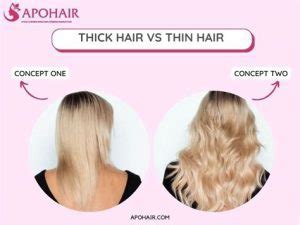Understanding the Differences
Scalp thickness, characterized by hair follicle density, can significantly impact hair health and styling options. Here’s an in-depth look at the differences between fine and thick scalps:

Fine Scalp
- Density: 120-150 hairs per square centimeter
- Strands: Thin and prone to tangling
- Appearance: Flatter appearance with visible scalp
- Common Concerns: Grease, volume loss, breakage
Thick Scalp
- Density: 200-300 hairs per square centimeter
- Strands: Thick and resilient
- Appearance: Fuller, thicker look
- Common Concerns: Oiliness, scalp irritation, product buildup
Key Differences and Pain Points
| Feature | Fine Scalp | Thick Scalp |
|---|---|---|
| Volume | Low, prone to flatness | High |
| Greasiness | High, frequent washing | Moderate |
| Breakage | Susceptible | Less likely |
| Styling | Difficult to hold curls or volume | Holds styles well |
| Product Buildup | Less buildup | Prone to buildup |
| Scalp Sensitivity | More sensitive | Less sensitive |
Motivations and Benefits
Fine Scalp:
- Seeking volume and coverage
- Prevent breakage and damage
- Control oil production
Thick Scalp:
- Manage oiliness and scalp irritation
- Reduce product buildup
- Achieve fuller, healthier hair
Tips and Tricks
Fine Scalp:
- Use volumizing shampoos and conditioners
- Apply root lifter at the scalp
- Blow dry upside down
- Avoid heavy styling products
- Consider extensions or wigs
Thick Scalp:
- Use clarifying shampoos and exfoliating scrubs
- Alternate between moisturizing and volumizing treatments
- Double-wash to remove excess oil
- Detangle thoroughly before washing
- Avoid silicone-based products
Common Mistakes to Avoid
Fine Scalp:
- Over-washing, which can strip hair of natural oils
- Using heavy products, which can weigh hair down
- Brushing too vigorously, which can cause breakage
- Neglecting scalp health
Thick Scalp:
- Using too many heavy products, which can clog follicles
- Not washing frequently enough, which can lead to oil buildup
- Over-conditioning, which can make hair heavy
- Ignoring scalp irritation
Conclusion
Understanding the difference between fine and thick scalps is crucial for tailoring hair care routines. By addressing specific pain points and motivations, you can achieve healthy, beautiful hair regardless of your scalp type. Embrace targeted treatments, smart styling techniques, and avoid common mistakes to enhance your hair’s volume, fullness, and overall health.
